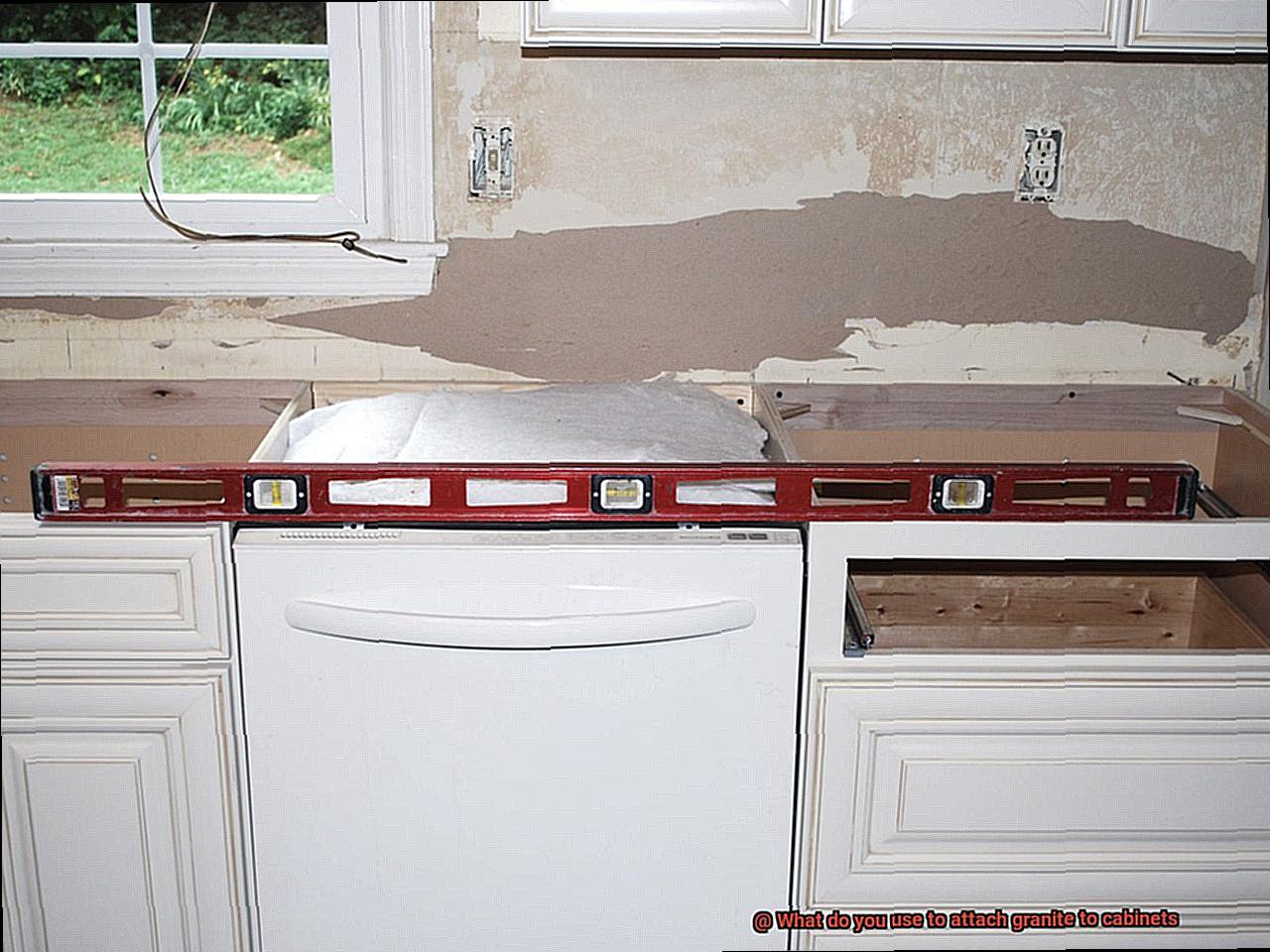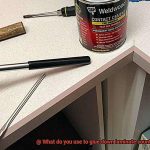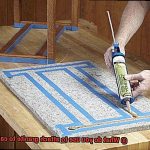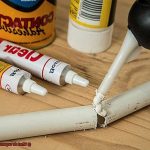Welcome to our blog post, where we’ll take a deep dive into the fascinating world of countertop adhesives.
When it comes to gluing down countertops, you’ve got options galore. From liquid nails to epoxy, each adhesive brings its own set of perks and pitfalls to the table.
And let me tell you, choosing the right adhesive can make or break your countertop installation experience. So buckle up, my friend, because in this post we’re going to explore all the popular options out there, weigh their pros and cons, and arm you with some handy tips for a successful countertop bonding adventure.
So grab yourself a steaming cup of joe, kick back, and get ready to become a bona fide expert in the realm of countertop adhesives.
What is Countertop Glue?
Contents
- 1 What is Countertop Glue?
- 2 Types of Adhesives for Gluing Down Countertops
- 3 Construction Adhesive
- 4 Epoxy Adhesive
- 5 Silicone Adhesive
- 6 Specialized Adhesives for Specific Countertop Materials
- 7 Factors to Consider When Selecting an Adhesive for Gluing Down Countertops
- 8 How to Apply the Adhesive Properly and Safely
- 9 Conclusion
Countertops not only serve functional purposes but also contribute to the overall aesthetic appeal of any space. To ensure that these surfaces remain securely in place and withstand daily use, it is crucial to choose the right countertop glue. In this comprehensive guide, we will explore different types of countertop glue, their applications, and how to select the best adhesive for your project.
Epoxy Adhesive:
- Consists of a resin and hardener mixture for a robust bond.
- Resistant to moisture, chemicals, and heat, making it ideal for kitchens and bathrooms.
- Provides excellent bonding strength for various countertop materials.
Polyurethane Adhesive:
- Offers strong bonding strength and flexibility.
- Suitable for wood, laminate, stone, and solid surface countertops.
- Resistant to water and temperature fluctuations for long-lasting adhesion.
Specialized Adhesives:
- Granite or marble-specific adhesives provide superior bonding strength for natural stone surfaces.
- Quartz-specific adhesives are designed to effectively bond quartz countertops.
Construction Adhesive:
- Available in tubes and applied with a caulking gun.
- Known for its exceptional bonding properties.
- Suitable for laminate, wood, and solid surface countertops.
Silicone Adhesive:
- Specifically designed for natural stone countertops like granite or marble.
- Provides a flexible bond that can withstand movement without damaging the material.
- Offers excellent resistance to water and heat.
Types of Adhesives for Gluing Down Countertops
Selecting the right adhesive for gluing down countertops is vital for ensuring a strong and durable bond. With numerous options available, it can be challenging to determine which adhesive is best suited for your needs. In this article, we will explore the different types of adhesives commonly used for countertops and delve into their unique properties.
Epoxy Adhesive: The Unbreakable Bond
Epoxy adhesives are renowned for their exceptional strength and durability. Composed of a resin and a hardener, these two-part adhesives initiate a chemical reaction that creates an unyielding bond. Highly suitable for stone countertops like granite or marble, epoxy adhesives can withstand moisture, heat, and chemicals that countertops may encounter during daily use. Their reliability makes them an ideal choice for long-lasting countertop installations.
Construction Adhesive: The Versatile Choice
Construction adhesive is a versatile option when it comes to gluing down countertops. Available in various formulations such as polyurethane and PVA, construction adhesives offer high initial grab and robust bond strength. They work exceptionally well with laminate, wood, and solid surface countertops, providing resistance to moisture, heat, and chemicals. Their versatility makes them a popular choice among homeowners and professionals alike.
Silicone Adhesive: Flexibility at Its Best
For ceramic tile or glass countertops, silicone adhesives are the go-to option. These adhesives possess excellent flexibility, allowing them to accommodate slight movements or shifts in the countertops over time. Silicone adhesives are highly resistant to water and moisture, making them an ideal choice for kitchen and bathroom installations where damp conditions may be present. Their flexibility ensures a secure bond while offering durability.
Specialized Adhesives: Tailored Solutions
Certain countertop materials necessitate specialized adhesives for optimal bonding. For instance, laminate countertops benefit from water-based adhesives that establish a strong bond between the laminate and the substrate. When working with specific countertop materials, it is crucial to adhere to the manufacturer’s instructions to ensure a proper bond. Following the recommended guidelines guarantees that your countertop installation will be secure and long-lasting.
Choosing the Right Adhesive: A Sticky Decision
When selecting an adhesive for gluing down countertops, several factors must be considered. These include the countertop material, exposure to moisture and heat, and specific installation requirements. To guarantee proper adhesion and a durable bond, it is essential to follow the manufacturer’s instructions. In instances of uncertainty, consulting professionals or countertop material manufacturers will provide expert guidance to ensure a successful installation.
Construction Adhesive
Construction adhesive, also known as construction glue, is a versatile and essential product used in the construction industry to bond various materials together. It is especially valuable when it comes to installing and securing countertops. Whether you’re working with laminate, granite, marble, or quartz, selecting the right adhesive is crucial to ensure a strong and durable bond.
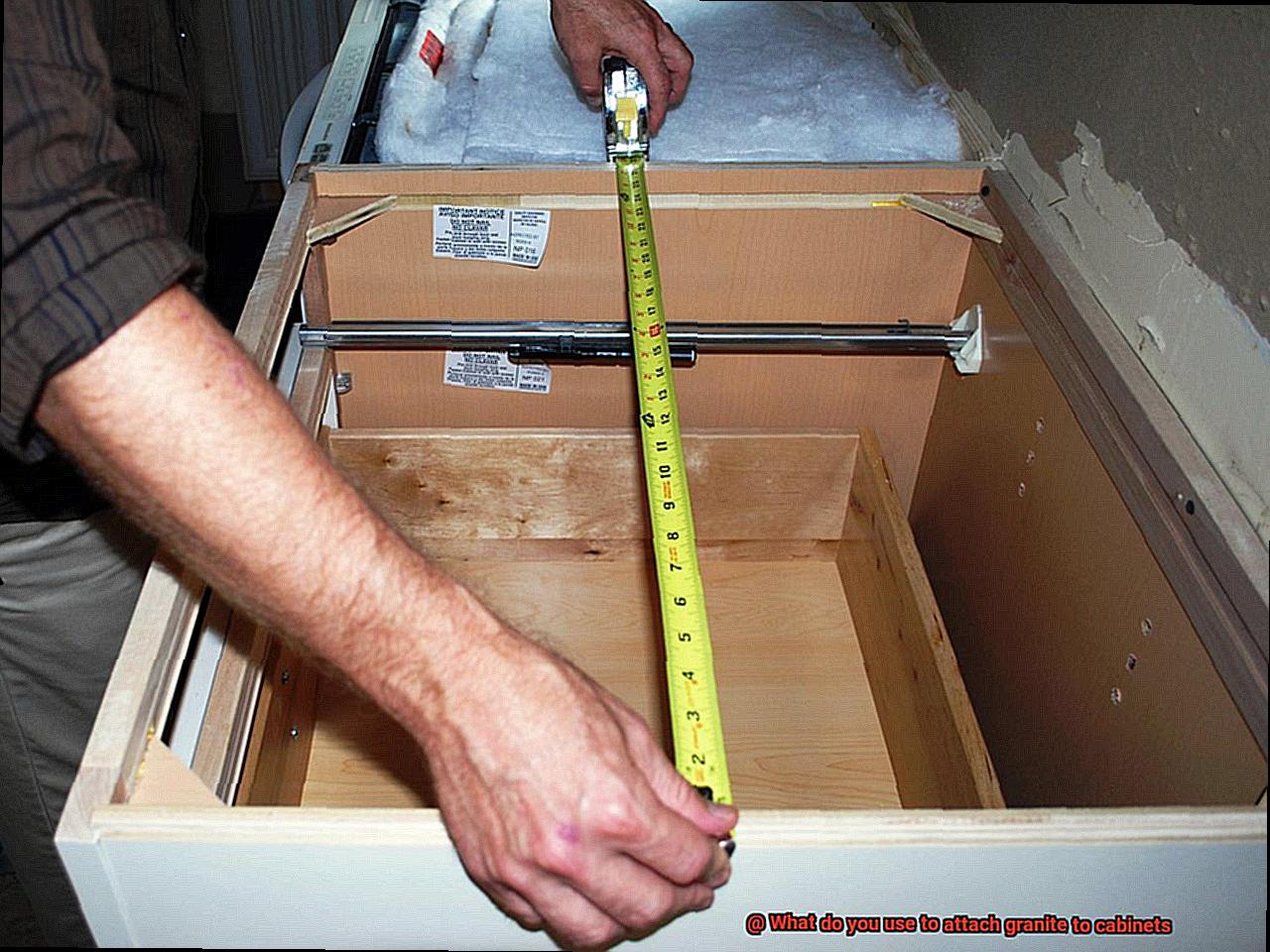
When it comes to choosing a construction adhesive for countertops, compatibility with the material is a key consideration. Different countertop materials have distinct properties, so it’s important to choose an adhesive that is specifically designed for the material you are working with. This ensures optimal adhesion and prevents any potential damage or loosening in the future.
Strength and durability are paramount factors when selecting construction adhesive for countertops. Countertops endure a significant amount of wear and tear, so you need an adhesive that can withstand heavy use and weight. Look for adhesives that are specifically formulated for high-stress applications and offer strong bonding capabilities. This will ensure your countertops stay securely in place for years to come.
Water resistance is another critical aspect to consider. Countertops often come into contact with spills, splashes, and humidity, making it essential to use a waterproof adhesive. This prevents any potential damage or loosening caused by moisture that could compromise the integrity of the bond.
Proper surface preparation is vital when applying construction adhesive to countertops. Before gluing down your countertops, ensure that the surface is clean, dry, and free from any dust or debris. This creates an ideal environment for adhesion and ensures a strong bond between the countertop and the substrate.
Lastly, always follow the manufacturer’s instructions when using construction adhesive. They have expert knowledge of their product and will provide guidelines on application patterns and recommended amounts of adhesive per square inch. By following these instructions, you can achieve optimal results and ensure a secure installation.
Epoxy Adhesive
Epoxy adhesive, the unsung hero of countertop installations, is a construction superhero ready to save the day when your countertops start to show signs of wear and tear. This versatile glue, consisting of resin and hardener components that are mixed together before use, creates a powerful adhesive known for its high strength, durability, and resistance to water and heat.
Before unleashing the power of epoxy adhesive, it’s essential to prepare the battlefield. Thoroughly clean the surfaces of your countertops to ensure a strong bond. Grease, dust, and debris have no place in this epic battle against loose countertops.
With cleanliness achieved, it’s time to mix your epoxy adhesive with precision. Thoroughly blend the resin and hardener until they become a dynamic duo capable of maximum bonding capability.
Now, it’s time for action. Spread the adhesive evenly over the entire area where the countertop will be attached, using a trowel or putty knife. Cover every inch with precision and care, like a true superhero.
Place your countertop on top of the adhesive, aligning it properly. Apply even pressure across the surface to ensure a strong bond between the countertop and supporting surface.
Now comes the waiting game. Allow the epoxy adhesive to cure according to the manufacturer’s instructions. Good things come to those who wait – in this case, a secure and long-lasting bond for your countertops.
After curing, inspect for any gaps or unevenness. Fill in any gaps with additional epoxy if necessary, smoothing out the surface like a true professional.
And there you have it. Your countertops are now firmly glued down, ready to withstand any spills or kitchen catastrophes that come their way. With epoxy adhesive as your construction superhero, you can rest assured that your countertops will stand strong and look stunning for years to come.
Silicone Adhesive
Well, fear not, because I have the perfect solution for you – silicone adhesive. This superhero of adhesives is here to save the day and keep your countertops securely in place.
One of the greatest advantages of using silicone adhesive is its flexibility. Unlike other adhesives that can become brittle and crack over time, silicone adhesive remains flexible even after it has cured. This means that as your countertops expand and contract with changes in temperature, the adhesive will move with them, preventing any cracks or breaks from forming. So go ahead and crank up the heat in your kitchen, because silicone adhesive has got you covered.
Another superpower of silicone adhesive is its resistance to moisture. Let’s face it, kitchens and bathrooms can be wet and messy places. But with silicone adhesive, you don’t have to worry about water seeping underneath your countertops and causing damage. It forms a waterproof seal that keeps everything nice and dry. Plus, it resists mold and mildew growth, so you can say goodbye to those unsightly stains and odors.
But wait, there’s more. Silicone adhesive also has excellent adhesion properties. It can bond to a wide variety of countertop materials, from laminate to granite to quartz. Whether your countertops are porous or non-porous, silicone adhesive will create a strong bond that will stand the test of time. No more worrying about your countertops coming loose or wobbling around.
Using silicone adhesive is as easy as 1-2-Just follow the manufacturer’s instructions, apply a thin layer of adhesive using a caulking gun or applicator, position your countertop in place, and let it cure. Once it’s fully cured, your countertops will be firmly glued down and ready to take on whatever you throw at them.
So why settle for ordinary adhesives when you can have the superhero of adhesives – silicone adhesive? With its flexibility, water resistance, and strong adhesion properties, it’s the perfect choice for gluing down countertops. Say goodbye to loose countertops and hello to a secure and durable bond that will last for years to come. Your countertops will thank you.
Silicone adhesive is made from a combination of silicone polymers, giving it its unique properties. These properties make it ideal for gluing down countertops.
- Flexibility: Unlike other adhesives, silicone adhesive remains flexible even after it has cured. This allows the countertop to expand and contract with changes in temperature without causing the adhesive to crack or break.
- Water Resistance: Silicone adhesive forms a waterproof seal, preventing water from seeping underneath the countertop and causing damage. It also resists mold and mildew growth, ensuring a clean and hygienic surface.
Specialized Adhesives for Specific Countertop Materials
When it comes to installing countertops, the right adhesive is essential for creating a strong and durable bond. Different countertop materials have unique properties that require specific adhesives. Let’s delve into the world of specialized adhesives and explore the types required for different countertop materials.
- Laminate countertops: The most common type of countertop, laminate requires contact cement for installation. This strong adhesive bonds effectively with laminate surfaces. Applied to both the countertop and the underside of the laminate sheet, it dries before pressing the two surfaces together, creating a secure bond.
- Solid surface countertops: Acrylic or polyester solid surface countertops demand specialized adhesives for seamless joints. Brands like Dupont Corian Adhesive and Wilsonart Solid Surface Adhesive are popular choices. These adhesive cartridges are applied using a caulk gun, evenly spreading them over the joint area before pressing the solid surface pieces together.
- Granite and natural stone countertops: Epoxy adhesives excel in providing exceptional bonding strength for heavy stone countertops. With two parts – resin and hardener – they’re mixed just before application. Once spread on the countertop surface, the stone slab is placed on top. The quick-setting epoxy creates a permanent bond between the countertop and stone.
- Quartz countertops: Quartz surface adhesive is specifically designed to bond with quartz surfaces, ensuring a robust and durable connection. Available in various colors to match quartz countertops, this specialized adhesive guarantees a seamless appearance.
- Wood countertops: For wood countertops, the choice of adhesive depends on the wood type and desired durability. Hardwoods like oak or maple can be glued down using Titebond III wood adhesive, offering waterproof and strong bonding capabilities. However, exotic or oily woods may require epoxy adhesives for proper bonding.
- Concrete countertops: Polymer-based concrete adhesives are essential for installing durable and versatile concrete countertops. These adhesives provide excellent adhesion between the concrete surfaces, enduring the stresses and movements that occur over time.
To ensure successful and long-lasting bonds, it’s crucial to follow the manufacturer’s instructions for specialized adhesive use. Proper surface preparation, application techniques, and curing times play a vital role. Additionally, consulting professionals or countertop manufacturers for specific recommendations based on your countertop material is highly recommended.
Factors to Consider When Selecting an Adhesive for Gluing Down Countertops
Selecting the right adhesive for gluing down countertops is crucial for ensuring a strong and durable bond that will withstand the test of time. Here are the key factors to consider when making your selection:
- Countertop Material: Different countertop materials require specific adhesives that are designed to bond effectively with them. Whether it’s granite, quartz, laminate, or solid surface, choose an adhesive that is compatible with the material you’re working with.
- Application Method: Consider the convenience and ease of application based on your skill level and available tools. Some adhesives come in tubes or cartridges that can be applied with a caulk gun, while others may require mixing before application.
- Curing Time: The curing time refers to how long it takes for the adhesive to fully harden and create a strong bond. Depending on your project, you may prefer a quick-curing adhesive to reduce downtime or a longer curing time for a stronger bond.
- Strength and Durability: Look for adhesives that have high tensile strength and are specifically formulated for bonding countertops. You want an adhesive that can withstand the weight and stress placed on the countertop without compromising its integrity.
- Moisture Resistance: Countertops are often exposed to water and other liquids, so choose an adhesive that can withstand moisture without weakening the bond over time. Waterproof or water-resistant adhesives are recommended.
- Temperature Resistance: Consider the heat resistance of the adhesive, as countertops can be subjected to high temperatures from hot pots and pans or direct sunlight. Look for adhesives with a high temperature resistance rating to ensure long-term durability.
- Safety Considerations: Always read the manufacturer’s instructions and safety data sheets to ensure proper usage and take necessary safety precautions. Some adhesives may emit harmful fumes or require protective gear during application.
- Availability and Cost: Choose an adhesive that is readily available in case you need additional supplies in the future. Compare prices to find an adhesive that fits your budget without compromising quality.
How to Apply the Adhesive Properly and Safely
Properly and safely applying adhesive when gluing down countertops is vital for a secure and long-lasting bond. In this comprehensive guide, we will walk you through the step-by-step process of selecting the right adhesive, prepping the surfaces, applying the adhesive, and prioritizing safety throughout the installation. Let’s dive in.
Choosing the Right Adhesive:
To start your countertop installation project on the right foot, it is crucial to select the appropriate adhesive for your specific countertop material. Different adhesives are designed to work best with different materials like laminate, granite, or wood. To ensure a strong bond, carefully read product labels or consult with experts to choose the right adhesive.
Prepare the Surfaces:
Achieving a proper bond requires clean and dry surfaces. Before applying the adhesive, thoroughly clean both the countertop surface and the underside of the countertop. Use a mild detergent or cleaning solution recommended for your countertop material to remove dirt, grease, or stains. Rinse thoroughly with clean water and allow sufficient time for drying before proceeding.
Apply the Adhesive:
Follow the manufacturer’s instructions carefully when applying the adhesive. Use a notched trowel or a similar tool to spread an even layer of adhesive onto either the countertop surface or the underside of the countertop. Apply enough adhesive for a solid bond without excessive squeeze-out.
Positioning and Pressure:
After applying the adhesive, take your time to carefully position the countertop onto the installation surface. Ensure proper alignment and make necessary adjustments before pressing it firmly into place. Apply even pressure using clamps or strategically placed heavy objects. This guarantees a secure bond between the countertop and underlying surface.
Prioritizing Safety:
During the application process, prioritize your safety. Some adhesives may emit fumes or contain hazardous chemicals. Therefore, work in a well-ventilated area or consider wearing personal protective equipment like gloves and a mask. Consult the adhesive manufacturer’s safety data sheet for detailed information on handling and disposal.
Curing and Cleanup:
Allow sufficient time for the adhesive to fully cure as recommended by the manufacturer. Avoid placing heavy objects or applying excessive force during this period to prevent compromising the bond. Once cured, clean up any excess adhesive using a suitable adhesive remover or solvent recommended by the manufacturer.
zz55GWYTefo” >
Conclusion
When it comes to gluing down countertops, there are a few options you can consider. One popular choice is using construction adhesive, specifically formulated for bonding surfaces like countertops. This adhesive provides a strong and durable bond, ensuring that your countertop stays securely in place.
Another option is using epoxy resin, which is known for its excellent bonding properties. Epoxy resin creates a strong and long-lasting bond between the countertop and the surface it’s being glued to. It also offers resistance to moisture and heat, making it an ideal choice for kitchen countertops.
If you’re looking for a more traditional approach, contact cement can be used to glue down countertops as well. This type of adhesive requires careful application, as it bonds instantly upon contact. However, once properly applied, contact cement provides a reliable and sturdy bond.
No matter which adhesive you choose, it’s important to ensure that the surface is clean and dry before applying the glue. Additionally, following the manufacturer’s instructions is crucial to achieve optimal results.
In conclusion, when it comes to gluing down countertops, construction adhesive, epoxy resin, and contact cement are all viable options. Each adhesive offers its own set of advantages and considerations.

